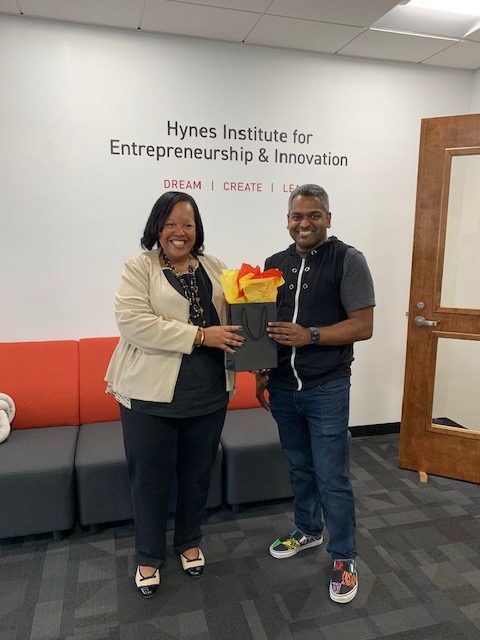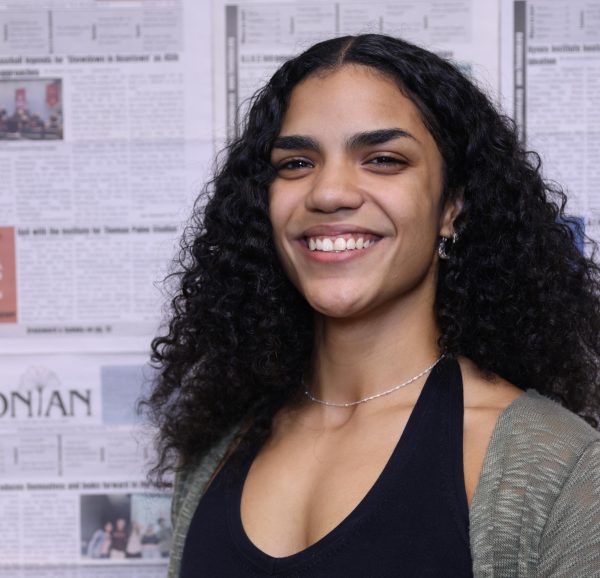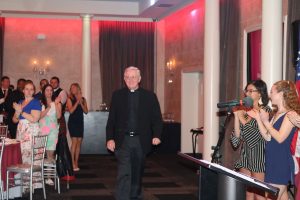Diversifying campus: A job for everyone
Photo courtesy of Alison Munsch
Dr. Munsch’s work with DEIB proves that Iona University strives for more when it comes to diversifying campus and promoting inclusivity.
December 8, 2022
If there are two things that have a difficult time co-existing, it is diversity and higher education. The two make an interesting equation that professionals like Dr. Alison Munsch of Iona University are trying to tackle. Although the answer to the equation may seem apparent, Dr. Munsch suggests the actual work to solve it takes a village.
Dr. Munsch started her role as interim associate provost for Diversity, Equity, Inclusion, and Belonging (DEIB) at Iona University on Sept. 1 of 2022, shortly after being asked to take on the position in late August. The position includes educating students and faculty as well as raising awareness on the broad subject of diversity.
“[My role] is a relatively new role,” Dr. Munsch said. “My goal is to make Iona University a better place in terms of celebrating, respecting and embracing diversity…My role is in support of trying to make that a reality.”
Before taking on her role as interim provost for DEIB, Dr. Munsch had been a professor at Iona University since 2008. She was an adjunct professor before joining the institution full-time in 2016. In her years teaching at Iona, Dr. Munsch made note of the lack of diversity in her classes.
“I have been teaching here a long time and my classroom has never been that diverse,” Dr. Munsch said.
However, Dr. Munsch believes that this realization has only opened the door for improvement at Iona University.
“I do think Iona as an institution has a willingness and a value to become more diverse,” Dr. Munsch said. “I feel that in this role that I’ve only been in for four months I have not received a lot of resistance to the things that I am trying to do.”
Iona University recently adopted DEIB as a way to help create a more inclusive and diverse campus. Iona University has been considered a diverse institution in comparison to other universities and colleges, but many people, including Dr. Munsch, believe that there are still ways to go when creating a space in which everybody feels as though they belong.
“I think [Iona University’s] diversity can certainly improve,” Dr. Munsch said. “It’s not homogenous by any stretch of the imagination, but there is absolutely room for improvement not only in the student population but also for faculty and staff.”
Improving Iona’s inclusivity is one of Dr. Munsch’s many channels of work. In her time as Interim Provost for DEIB, Dr. Munsch has worked with many campus constituents, all while constructing various training courses and toolkits designed to help administration and staff be more conscious of themselves.
“I work with Human Resources to help them understand how we can have more inclusive resources, policies, procedures and programs,” Dr. Munsch said. “I am putting together an inclusive recruiting tool kit to give Human Resources the tools to be more inclusive in their practices and procedures.”
In her trainings, Dr. Munsch focuses on a phenomenon called the “unconscious bias,” claiming that it is perhaps one of the more compelling reasons for the lack of diversity and inclusivity on college campuses.
“Unconscious bias is something that we all have,” Dr. Munsch said. “When we have bias against different groups and different people it results in a behavior called microaggressions, insults, slights, snubs, etc. So, unconscious bias training is also a role of mine.”
Dr. Munsch encourages all students and faculty/staff to participate in the Unconscious Bias training when possible.
Dr. Munsch also hopes to extend those same trainings and procedures to students at Iona—and in doing so she has also created what she refers to as “cultural communication.”
“I have created cultural communication that highlights specific cultural celebrations that I have not seen done in the past,” Dr. Munsch said.
In September, DEIB had a cultural communication to celebrate Hispanic heritage and in the months that followed DEIB formed cultural communications aimed to help celebrate Italian, German and Native American heritage, as well as Diwali, a South Asian celebration. In December, the organization aims to celebrate National Humanitarian Day. These cultural communications help broaden people’s knowledge of multicultural groups.
Aside from creating cultural communication across campus, Dr. Munsch is also working with the honors and core curriculum committees in an effort to educate them on more inclusive teaching styles. Dr. Munsch has adopted those inclusive and diverse teaching styles herself by inviting professionals of all backgrounds to come speak to students.
“I am an academic now, but I spent 30 years in the business world, and I keep my networks very strong because a part of my pedagogy is to bring people from the industry into the university and classroom, so students understand that what they are learning has value outside of these campus walls,” Dr. Munsch said.
DEIB is also partnering with Morgan Stanley’s diversity initiative called the Equity Collective after Dr. Munsch reconnected with one of her former students who is also the director of Morgan Stanley’s Equity Collective.
DEIB and the Equity Collective work together to help expose diverse groups of students to the financial services industry. The Equity Collective is partnered with 27 asset management firms to educate and teach some soft skills to students of all backgrounds.
Dr. Munsch hopes for more engagement with DEIB in the upcoming semester. After its reconstruction, students and faculty/staff will be able to read more about the workings of DEIB on college campuses. College constituents are also encouraged to make note of DEIB events by checking the diversity box in 25Live, a scheduling software.
Dr. Munsch wishes for participation from students and faculty, because she and many others believe that the embracement of DEIB at Iona will require everyone.
“It is going to take a collective collaboration to make Iona University a place that really is representing a model for diversity, equity, inclusion and belonging in higher education,” Dr. Munsch said.
Understanding diversity and all of its synonyms can be difficult for some, because definitions of these words are very broad. Dr. Munsch feels that although diversity is boundless and varying, it should be brought together with commemoration.
“Diversity is all the different ways that humans are human. It’s not just race and ethnicity, its gender, sexual orientation, class, body type, etc.,” Dr. Munsch said. “It should be respected and celebrated.”
As for the future of diversity at Iona University, Dr. Munsch remains optimistic and will continue working to achieve all that DEIB stands for.









